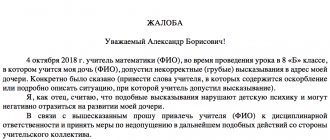It happens that a teacher working with children violates his official duties. He may be biased towards the student, behave rudely and negligently. If you are sure that your child’s rights are being violated and you have evidence, you can file a complaint against the teacher with the school principal. If he refused to resolve the conflict or took the teacher’s side, you need to contact higher authorities.
When to write a complaint
Important! Please keep in mind that:
- Each case is unique and individual.
- A thorough study of the issue does not always guarantee a positive outcome. It depends on many factors.
To get the most detailed advice on your issue, you just need to choose any of the options offered:
- Use the online chat in the lower corner of the screen.
- Call: Federal number: +7 (800) 511-86-74
A complaint against a primary, secondary, or high school teacher must be filed in the following cases:
- negligent attitude towards a specific student or group, too high demands;
- improper performance of official duties;
- insults, shouting and rudeness towards children, use of force;
- the use of parenting methods that adversely affect the emotional state of the child (for example, humiliating him in front of his friends);
- collection of funds not agreed with the management of the educational institution;
- prohibition from attending classes due to unpreparedness, improper appearance, etc.;
- discrimination based on religion and nationality;
- forced physical labor for health reasons;
- grades are not for knowledge of the subject, but for effort and behavior;
- inclusion of material not from the school curriculum in the lesson topic;
- causing material damage (damage to gadgets, etc.);
- undeserved “twos” (underestimation of grades).
The protection of children's rights is regulated by paragraph 59 of Government Resolution No. 196.
Responsibilities of all teachers
The teacher's responsibilities include:
- conducting teaching activities at a high professional level, ensuring the implementation of educational programs;
- compliance with professional ethics, respect for the honor and dignity of all participants in the educational process (children, colleagues, parents);
- compliance with legal and moral standards;
- application of methods and forms of education and training that ensure a high level of quality of work;
- taking into account the individual characteristics and health status of children;
- regular improvement of professional competence;
- certification for suitability for the position held;
- upon entry to work and annually undergo a medical examination;
- compliance with the Charter, Internal Rules, and School Regulations.
This range of responsibilities is established by Art. 48 of the Federal Law “On Education” and it cannot be expanded at the will of the school administration or regional departments.
Job description for a primary school teacher. Rights and responsibilities of a teacher
To know
Responsibility of an additional education teacher at school. Job description
Read
Compilation rules
The complaint is written in any form, however, in order not to be refused consideration, it must be completed in compliance with certain rules.
In the header of the sheet indicate:
- FULL NAME. addressee and his position;
- full name of the educational institution, address;
- FULL NAME. the applicant, indicating who the child is related to (father/mother, guardian, etc.);
- contact information for receiving a response (telephone, postal or email address).
The text of the complaint contains the following information:
- a detailed description of the problem, with the obligatory indication of the full name. teachers;
- requirements;
- a list of attached materials proving violation of the rights of the child;
- date and signature.
It is recommended to attach a video recording the teacher’s misconduct, testimony of witnesses (written or printed, indicating their contacts).
The claim must be written in a formal business style. It may not be accepted for consideration if:
- it contains insults, swearing;
- there are errors;
- written in illegible handwriting;
- sent anonymously;
- it has already been answered;
- The text contains inaccurate information.
Applicable types of liability
Often, the parent is not interested in the possibility of bringing the teacher to legal liability. Legal representative. As a rule, he looks for ways to refuse a teacher who annoys the child. But at the same time, depending on the type of violation and the resulting consequences, the teacher may be held accountable for different types of liability:
- disciplinary;
- administrative;
- criminal;
- civil.
Disciplinary punishment
Disciplinary action can only be applied by the administration of the educational institution or by employees of the education department. For this purpose, an official investigation is carried out, during which not only the claim is studied, but also an explanation is taken from the guilty party, that is, from the teacher. The teacher has the right to defend himself and prove the legality of his actions.
At the end of the investigation, the inspecting party prepares an order imposing disciplinary punishment, which can be in the form of an oral or written reprimand, as well as dismissal. What consequences will occur in a particular case depends on the severity of the dispute, as well as the consequences and the number of affected parties.
Attention! Wrongful dismissal can be challenged by a person in court, so it is necessary to strictly follow the procedure without violating the rights and interests of the teacher himself.
The second point to pay attention to is the early termination of an employment contract at the unilateral initiative of the employer. When drawing up a work contract, additional clauses are added to the content of the agreement, which may become grounds for dismissal. In particular, this concerns a significant violation of the rights and interests of children (for example, the use of physical force or psychological violence).
Administrative responsibility
The Code of Administrative Offenses provides for two types of offenses for which there is liability under the Code of Administrative Offenses of the Russian Federation. The first group is a violation of the child’s right to education. In particular, this applies to putting children out the door during the educational process. A teacher who commits such actions may be punished with an administrative fine, the amount of which will vary from 30 to 50 thousand rubles.
If such a violation is repeated, the teacher may be deprived of the right to engage in teaching activities for a period of up to one year.
The second group of violations is related to the implementation of the educational process itself. If it is confirmed that the teacher’s actions disrupt the learning process, he will face a fine of up to 30,000 rubles.
Punishment is applied only by a judge based on the administrative material compiled by the police.
Punishment under the Criminal Code of the Russian Federation
A teacher, as an official, may be subject to various articles of the Special Part of the Criminal Code. This also applies to the infliction of bodily harm, confirmed by the conclusion of a forensic expert. In this case, criminal proceedings are drawn up, which are investigated in the general manner. The teacher must be prepared for the fact that the measure of responsibility will not be the weakest, since there is an aggravating circumstance - the teacher commits a crime against his subordinate, a child who cannot independently protect his interests.
Attention! A ban on teaching activities is used as an optional punishment.
In addition, there is one rule under which only teachers can be held criminally liable. This is a cruel violation of the right to education. The extent of liability depends on the individual characteristics of the case. Thus, a teacher may suffer the following types of punishment:
- a fine, the amount of which cannot exceed 100,000 rubles or cannot be higher than the person’s annual income;
- no more than three years of forced labor with mandatory deduction of part of the profit to the state (from 5 to 20 percent of wages);
- up to three years in prison;
- deprivation of the right to engage in educational activities for a period of up to five years.
Civil responsibility
The Civil Code of the Russian Federation provides for the possibility of individuals to receive monetary compensation for material and moral damage caused. The presence of conflicts between teachers and students is no exception. Moreover, filing a lawsuit to withhold compensation may occur regardless of the accompanying investigation.
The child's legal representative who believes there are sufficient grounds to receive the money must do the following:
- obtaining supporting facts that there are grounds for receiving compensation;
- collection of evidence indicating the guilt of the teacher, as well as the legality of the demand for monetary payment;
- calculation of the amount of compensation (confirmation of the amount with financial documents);
- preparation of a substantiated statement of claim, which is sent to a federal court of general jurisdiction, taking into account the requirements of territorial jurisdiction.
Withholding moral damages is a little more difficult in practice, since it is not easy to prove. On the other hand, the teacher’s unlawful actions violate the rights and interests of minor children, so the amount of compensation will be much higher.
Attention! It is permissible to prepare and submit a collective claim to the court.
Thus, the law provides a lot of possibilities for which legal representative can protect the interests of a minor child. If there are doubts that it will be possible to achieve justice, then you can involve a qualified lawyer in the conflict who will help resolve the dispute.
Where to complain
The complaint is submitted to:
- directorate;
- RONO department;
- Department of Education;
- ministry;
- Prosecutor's Office;
- court.
Director
If a teacher acts unlawfully, the director must be informed about it. Usually the conflict can be resolved by agreement of the parties.
Usually a complaint is written to management if a teacher behaves unprofessionally or uses non-pedagogical methods of education.
Complaints about the teacher to the director can be found at the following link.
The claim must be written in 2 copies, the director must sign on one of them. You keep this copy for yourself. Once a complaint is filed, a response is usually received within 30 days, although the time frame for review is not regulated by any law. If there is no information on the decision, then the application must be written to higher authorities, and a copy of the complaint from the school management must be attached to it.
RONO
This body is responsible for monitoring educational institutions. After receiving a complaint, an inspection will be carried out at the school where the teacher works. The claim is made using a standard form, which you can download from the following link.
You can submit a complaint in the following ways:
- carry it personally;
- make a phone call;
- send by mail;
- send by email;
- fill out online on the City Hall website using the link (for Moscow residents).
You can view addresses and phone numbers by following the link.
Department
When the director of an educational institution or RONO does not take action against a teacher who has violated ethics, a complaint must be filed with this authority. If the teacher’s guilt is proven after an inspection, then not only the teacher, but also the head of the school and employees of the Regional Educational Institution will suffer administrative and disciplinary punishment (and in especially severe cases, criminal punishment).
The text of the complaint differs from the appeal to RONO only in the heading (the addressee changes). After reviewing the complaint, the Department of Education will notify the complainant of its decision in writing.
The complaint is submitted in the same ways as in the RONO. Postal address for residents of the capital: Moscow, Bolshaya Spasskaya, 15, 129090. Reception of citizens is carried out: Moscow, Academician Tupolev embankment, 15, building 4.
Public reception number: +. Mail: .
Residents of other regions can view contacts by following the link (here are the websites of regional authorities, they have all the necessary information).
Ministry
You need to complain to this authority if the director, RONO, or the education department are inactive. And also, if the solution to the conflict situation does not satisfy you. A sample claim can be downloaded from this link.
The submission methods are the same for both residents of the capital and regions:
- through the official website using the following link;
- by personal visit or by sending a letter to the address: Moscow, st. Tverskaya, 11, GSP-3, 125993;
- by email:
You can ask any questions you may have by phone: + 7 (495) 539-55-19, +.
Prosecutor's office
A statement to this body is written when moral or physical harm is caused to a child. Also, the reason for applying may be illegal collection of money or bribe.
The Prosecutor's Office will ask about what happened, and based on the testimony, they will provide a sample statement. If violations are identified, the authority may decide on administrative penalties or refer the case to court.
The address of the General Prosecutor's Office of the Russian Federation for sending letters and receiving citizens for residents of the capital: 109992, Moscow, Krestyanskaya Zastava Square, 1. You can view information about regional authorities on the website at the following link, or find out by calling the hotline number. The application is submitted as follows:
- By sending a letter.
- By placing it in a special box for citizens’ appeals, located in the reception area of the Prosecutor’s Office. The address is listed above.
- By visiting the Prosecutor's Office at the specified address (for Moscow above).
- Via the website via the link.
Here is a sample complaint to the prosecutor's office.
Court
This authority should be contacted only in extreme cases. For example, when it was not possible to resolve the issue pre-trial, but you want to receive compensation for moral or material damage.
To obtain compensation, the court must provide evidence of psychological or physical abuse. Be sure to show medical certificates and reports, examination results.
Address of the Supreme Court of the Russian Federation: 121260, Moscow, st. Povarskaya, 13. Telephone. You can view contacts in the regions on the website using the link. The claim is submitted to the court in person, sent by mail or filled out online on the previously specified website.
Here are details on how to file a claim in court.
Responsibilities of class teachers
Classroom management is a separate area of teacher activity. This position imposes on the teacher the following responsibilities :
- provide school-family connections;
- provide assistance to parents in raising children;
- interact with subject teachers;
- organize the educational process in the classroom in order to develop the personal potential of each child;
- conducting educational work through classroom hours and extracurricular activities;
- encouraging children to receive additional education;
- maintaining class documentation (plan of educational work, personal files of students, class journal);
- regulation of relationships between children in the class, between children and teachers;
- create a positive psychological climate in the classroom;
- study the individual characteristics and abilities of children in dynamics;
- determine the prospects for the development of the class team;
- Monitor children’s progress and attendance at lessons and extracurricular activities.
The class teacher is an assistant to the family and school in raising children. The harmonious development of the psychological and moral qualities of children depends on his skill and sensitivity.
What a teacher is not allowed to do
The Law “On Education” introduces the responsibility of the teacher :
- for the provision of paid educational services in their school;
- conducting political campaigning in the process of educational activities;
- forcing children to accept any beliefs (religious, political) or renounce them;
- inciting racial, national, social, religious hatred, intolerant attitudes towards people with different beliefs, other nationalities or developmental disabilities;
- encouraging children to take actions that violate the Constitution of the Russian Federation.
Collective statement from parents
Collective applications from parents can be submitted in situations where it is necessary to resolve important issues with the participation of the management of the school’s educational institution and teachers. Situations may vary. Thanks to a written statement, the request, if it was expressed in a collective appeal, will not be forgotten. If such a request is conveyed orally, it may remain unfulfilled as a result of the daily bustle of worries.
The written application will be registered at the reception of the educational institution and will be under the control of the secretary and the school director.
Unlike a single statement from parents, when it is required to release a student from lessons, or to explain his absence from classes, or to complain about a student or teacher, collective statements can be sent if offenses are detected in the school community against a group of students or the entire class. The reason for the collective statement may be the teacher’s rude treatment of the class or his unprofessionalism, as a result of which parents turn to the school management to remove such a teacher from work, or vice versa - in defense of him, in the event of an unfounded accusation of any violation.
The form of a collective application does not differ from an individual one, with the exception of some features that occur when filling out the “header” and signatures of the document.
The algorithm for filing a collective application is as follows:
- The “header” of the application is placed in the same way as in an individual application in the upper right part of the page, indicating the addressee’s details.
- But the display of the group of persons who apply with an application must be filled out, indicating the details of each parent. If the list is very large, then in this case, one representative with his details can be recorded on behalf of the team.
- The content of the document will need to describe suggestions or complaints that will satisfy each parent.
- If there are additional documents confirming the message set out in the text, they will need to be attached to the application displaying the list.
- The final stage of such a document is the date of its preparation and the mandatory signatures of all parents who took part in the application, with a transcript of their last names.
Such a statement must be drawn up in at least two copies. One is sent to the addressee in any convenient way, and the second remains, either with the representative, or can be duplicated by creating photocopies for each signatory of the application.
Sample
Procedure for filing a claim
In cases of appeal against actions related to pedagogical processes, claims are sent to:
- the head of the educational institution;
- to the education department of the relevant municipality;
- regional department of education;
- Ministry of Education and Science of Russia;
- Federal Service for Supervision in Education and Science of the Russian Federation.
Attention! Our qualified lawyers will assist you free of charge and around the clock on any issues. Find out more here.
In what cases is it served?
- The teacher uses educational methods that have a negative impact on the child;
- The teacher uses educational methods that are considered illegal;
- The teacher uses physical punishment on students;
- The teacher discriminates against the child, puts him below other students;
- The teacher hinders the child's development;
- The teacher does not fulfill his duties at all;
- The teacher collects money from students for needs not provided for by the school management or not agreed upon with it;
- The teacher teaches information that is not included in the school curriculum.
How to differentiate between prejudice and demandingness
Excessive demands are not always a manifestation of the teacher’s biased attitude
As a rule, parents learn about problems in the relationship between the teacher and their child from the lips of the child. And, of course, he brings his subjective assessments and emotions into the story, often drawing the line: “She (he) doesn’t love me and is nagging me.” In this situation, it is difficult for moms and dads to figure out whether this state of affairs is an objective reality or the result of the student’s suspiciousness or imagination. In addition, many children perceive the teacher’s demandingness as a manifestation of a biased attitude. Therefore, it is very important for parents to get a correct picture of the existing relationship. For this:
- talk with your child more often about topics related to school life - this way it will become clear where the truth is and where the fantasies are;
- pay attention to the child’s performance in the subject taught by the teacher who is making complaints about your student (if the grades have dropped sharply, then work with the child or hire a tutor, then you can draw a conclusion about the objectivity of grading);
- visit the school, talk with teachers and the class teacher, but do it not “about”, but as a monitoring of progress (neither the child nor the teachers need to know the real reasons for the visit to the educational institution).
This way you will be able to understand what kind of relationship your student has with teachers and students. And also find out whether the teacher is really biased towards the child, or is simply demanding regarding the quality of knowledge.
How to psychologically adjust a child
Trust is the basis of a relationship with a child
Relationships between people are multifaceted, so it is not surprising that some people like them and others don’t. Interpersonal relationships between teacher and students are no exception. A teacher is a person like everyone else, so he can have likes and dislikes. Some teachers like active, inquisitive students, while others like disciplined quiet ones. Of course, a professional teacher knows how to hide his emotions, but sometimes exceptions happen. In this case, a conflict situation arises with three participants:
- student;
- teacher;
- parents of the student.
The task of the latter is to find a way out of the situation with minimal losses for the emotional health of the emerging personality. Therefore, it is very important to properly set up the child in this particular situation:
- Tell your child how much you love him more often - the child should be sure that he is accepted and loved by those closest to him;
- Explain that any child, even if he is still small, is also a person, and no one has the right to insult, ridicule or humiliate him;
- Analyze the conflict situation with maximum objectivity - regardless of who was wrong, explain to the offspring why such behavior is unacceptable;
- Try, together with your child, to outline a strategy for behavior in case the teacher finds fault or allows insults;
- Outline a plan for further joint actions (conversation with the teacher, director, moving to another class or school) to resolve the current situation.
Review results
Based on the results of verification actions carried out as part of the consideration of the appeal, the requirement to hold the teacher accountable may be declared untenable. The right to judicially appeal such a negative result is unconditional; no one can limit or deprive a person of such an opportunity.
A positive outcome for the parent who filed the claim may lead to the following negative consequences for the teacher and his colleagues:
- loss of job - dismissal;
- bringing to disciplinary liability with the imposition of a penalty in the form of a reprimand or reprimand;
- imposition of an obligation to compensate for material damage caused;
- compulsion to compensate for moral damage;
- imposing obligations to level out a conflict situation;
- recognition of the charter and internal regulations of the school as inconsistent with the law;
- application of punishment provided for by the administrative or criminal legislation of the Russian Federation.










